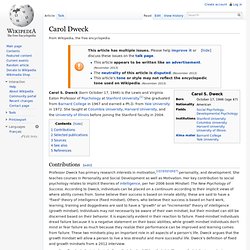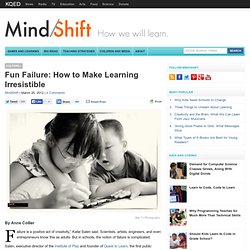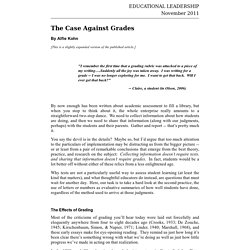

Mindset (book) Carol S.

Dweck (born October 17, 1946) is the Lewis and Virginia Eaton Professor of Psychology at Stanford University.[1] She graduated from Barnard College in 1967 and earned a Ph.D. from Yale University in 1972. She taught at Columbia University, Harvard University, and the University of Illinois before joining the Stanford faculty in 2004. Contributions[edit] Professor Dweck has primary research interests in motivation,[2][3][4][5][6][7] personality, and development. She teaches courses in Personality and Social Development as well as Motivation. "In a fixed mindset students believe their basic abilities, their intelligence, their talents, are just fixed traits. This is important because (1) individuals with a "growth" theory are more likely to continue working hard despite setbacks and (2) individuals' theories of intelligence can be affected by subtle environmental cues. Selected publications[edit] Dweck, C. Sources[edit] See also[edit] Goal orientation References[edit]
Fun Failure: How to Make Learning Irresistible. Culture Bao Tri Photography By Anne Collier Failure is a positive act of creativity,” Katie Salen said.

Scientists, artists, engineers, and even entrepreneurs know this as adults. But in schools, the notion of failure is complicated. Salen, executive director of the Institute of Play and founder of Quest to Learn, the first public school based on the principles of game design in the U.S., explained how failure can be a motivating agent for learning in her presentation at SXSW. Any practice – athletic, artistic, even social – involves repeatedly failing till one gets the experience or activity right. Game designer Jane McGonigal makes a similar point. But the opposite is true in school, Salen said. Over the past year, Salen went on a “listening tour,” interviewing game designers at Media Molecule, Valve, and Blizzard Entertainment. Don’t shoot the player while she’s learning. A version of this post appeared on NetFamilyNews. Related. The Case Against Grades. November 2011 The Case Against Grades By Alfie Kohn [This is a slightly expanded version of the published article.]

Habits of Mind. Learning Through Failure - Getting Unstuck. "Spectacular failure is better than moderate success.

" - Faste, Stanford Dept Mechanical Engineering How many of us can say this after a spectacular failure? For those whose jobs day-to-day innovation, this often is one of their secrets of success. One of the books I'm reading now is To Engineer is Human. It doesn't take long to get Petroski's message - failure is involved in any successful design.
The problem is, we often don't hear about failures - and the problem is more severe in schools. One of the most pernicious things about hiding failure for students is that it discourages healthy risk-taking and can have profound intellectual and creative stunting consequences in adulthood. Resilience and optimism may not come easy for some kids, so it's important to know how to encourage in a way that is credible but also constructive. Technorati Tags: learning, motivation, engineering, creativity, innovation, mistakes, education, perfectionism, gifted, entrepreneurship, optimism, EQ.